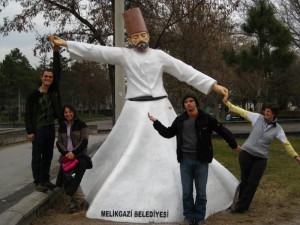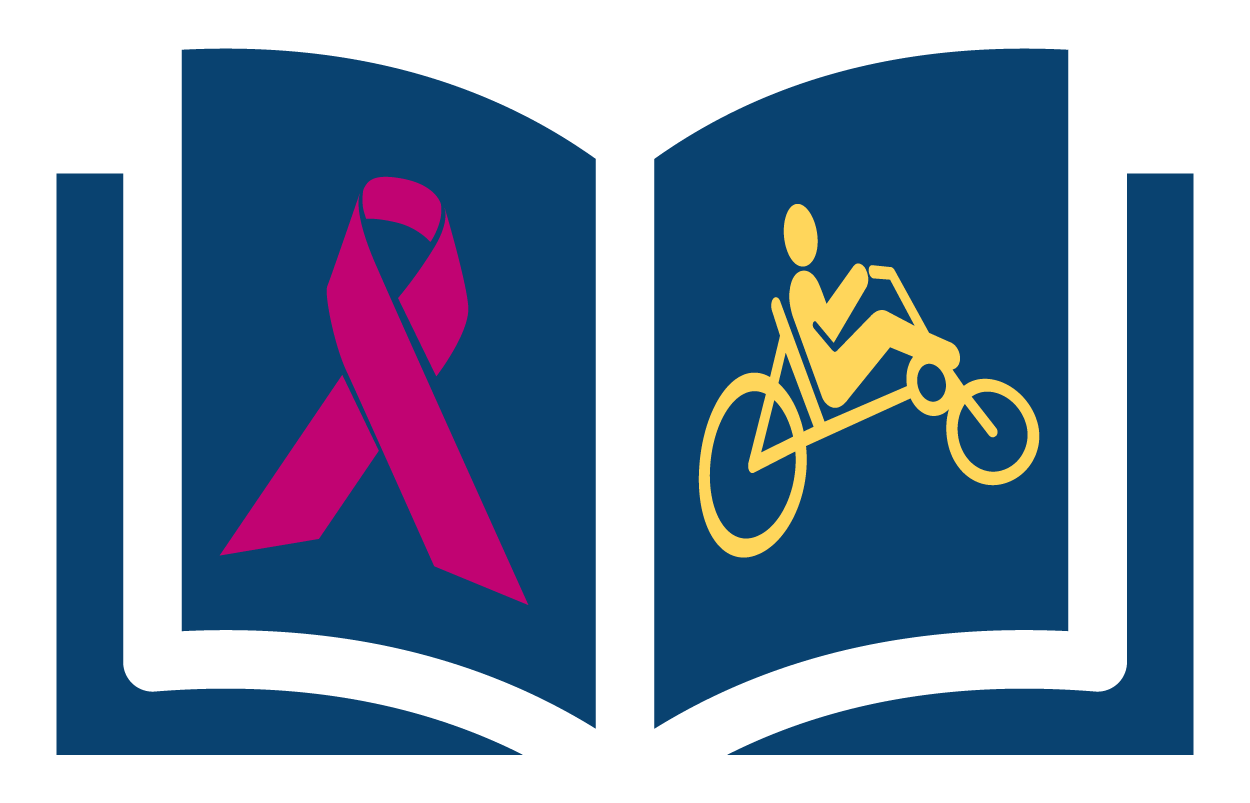After a brief bus ride, we arrived in Kayseri – home of Metin’s parents. We were met at the bus station by Metin and Mehmet, who had arrived in Kayseri earlier that morning after a 12-hour drive. They had brought their three mountain bikes on a rack on their rental car, but unfortunately only one of our recumbent fit on the rack. Mehmet seized the opportunity for a longer ride on Becky’s bike, and rode the 10 km to the home of Metin’s parents.
Metin’s parents have a beautiful apartment in Kayseri. The ceilings are over 3 meters high, and every room has beautiful crown moldings. With such high ceilings it is possible to have chandeliers that don’t look overwhelming and are high enough that there is no risk of banging one’s head into them. Quite the contrast from typical apartments and apartment-condos in North America. We are beginning to understand why living in an apartment block is so much more popular in other parts of the world.
When we arrived, Scott shouted up “Iyi Bayramlar” to Metin’s mother (rough translation: Happy Bayram), much to her amusement. People in Turkey are happy for any attempt by foreigners to learn Turkish, so our limited attempts almost always result in a smile or giggle.

We were invited to their home to join the family for their Kurban Bayram celebration. Fortunately, Metin’s father took care of the morning excitement (the actual animal sacrifice). Our only responsibility was to enjoy the plethora of great food that was place in front of us, and smile and nod when people came to visit.
Kurban Bayram is the Festival of Sacrifice or as our friend Mehmet likes to call it “The Victim Festival”. It is also translated as the “Feast of Sacrifice”. In Arabic it is Eid Al-Adha. In Turkey, it is a 4-day holiday. This year, because the entire holiday occurs during the week, most people had a 9-day holiday (including the weekends). The festival celebrates Abraham’s willingness to sacrifice his son Isaac to God (Genesis 22:1-24). A key part of the festival is the sacrifice (slaughter) of either a sheep or a cow. People join together to purchase an animal (always an odd number of people). Each person’s portion of meat is divided into three – one for the poor, one to be shared among neighbours and friends, and one for the family. Often this provides the family with meat for several months. The other important part of the festival is the opportunity for families to visit one another. Both the first and second day of the festival are filled with visits between family and friends. Each visit involves an update on how everyone in the family is doing.
Shortly after our arrival, Metin took us on a drive around Kayseri. When we drove by one of the sacrifice locations, we insisted on stopping to take a few pictures. Scott was braver than Becky and got a little bit closer. In Kayseri (as in other cities), it is not permissible to sacrifice animals in your yard or garage, you must do this at a designated slaughter location. In Goreme, being a small town, we saw several people chopping up sheep on their front lawns. The most common time for slaughter is the morning of the first day of Bayram, but some people are slaughtering on the second day as well.

As we were driving, we passed a large fiberglass whirling Dervish. We had to get out of the car and have our picture taken – since it was unlikely we were going to see real Whirling Dervishes while in Turkey, Becky just had to have her picture taken (and do a quick whirl) with the fiberglass one! It turns out the Dervish was at the entrance to the graveyard that housed the tomb of Seyyid Burhaneddin, one of Mevlana’s teachers . Mevlana is more commonly known in the western world as Rumi – poet, philosopher, musical composer, and founder of Sufi sect, including the Whirling Dervishes. It was supper cool to go and visit his tomb.
Our evening was topped off with a wonderful Bayram dinner – unfortunately it did not occur to us to take a picture (oops). Both of Metin’s parents are excellent cooks, with Metin’s father specializing in meat and sweet desserts. The cooking and baking had been completed before we arrived, or Becky would have spent the whole time in the kitchen trying to learn from the experts.
For every Kurban Bayram the local news is filled with the same three stories:
1 – A cow gets loose and runs through traffic. Many men run around chasing the cow until it is caught.
2 – The emergency rooms of full of men that have either been stepped on or kicked by an animal or who have cut themselves while butchering the animal.
3 – Car accidents caused by too much traffic.
We got to observe #1 and #3 on television, but #2 we also got to see first-hand experience. One of the Bayram visitors to Metin’s parents had cut himself rather badly during his sacrifice.
On Tuesday we drove up to the hills just outside of Kayseri where Metin’s family has a house. This house is treated similar to how we would treat a cottage in eastern Canada. The family spends most of their summer up at the house, which has many gardens and several fruit trees. We were even able to sample some of the wonderful produce.

During our visit we walked around the hills that have many memories for Metin. We had to get a picture of Metin posing at his favourite rock, and another with his “twin”. Upon arriving in Kayseri, Metin’s mother commented that Scott and Metin looked like twins (minus the glasses and hair colour). As a result, we had to get a picture of the twins together.
Our dinner up at the house included a tradition dish of Kayseri called Manti that is a small pasta with an envelope of meat (like a really tiny ravioli) in a tomato sauce on which you add yogurt. This was followed by freshly barbequed Kebabs.
Shortly after dinner, the decision was made to get home quickly. While we were eating it had begun to snow pretty heavily. We wanted to get home before the roads closed. Fortunately, snow is not foreign to Kayseri, so both Metin and his father knew how to drive in it. As we were going down a hill towards the city we saw an overturned van. We guess that he must of hit some black ice on the way down. We were glad to get home safely.
Our evening ended with being dropped off at the bus station, at the last moment as usual. We said our good-byes and hopped on the bus to Antakya.
Mehmet, Metin, and Gul – thank-you so much for all your hospitality. You have helped to ensure that we really enjoyed our time in Turkey. We hope to visit you again in January – and we hope that someday you can visit us in Canada. It will be a challenge for us to show you the same hospitality you have shown us, but we’ll try!

Leave a Reply